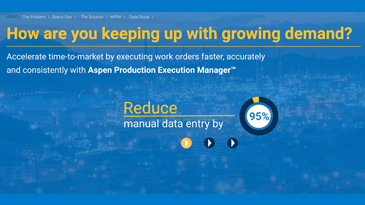Have you ever been frustrated or had a sinking feeling when you need a product but can’t find it in stock anywhere? The pharmaceutical industry is not immune from this challenge, especially given the disruptive impacts of the pandemic. One of the most effective remedies is to build greater efficiency and consistency into pharmaceutical production. Pharma 4.0 is a framework that focuses on this. The term was coined by the ISPE, contextualizing approaches and benefits that adjacent industries have experienced under Industry 4.0.1 This was a major theme of the recent ISPE Annual Meeting & Expo, which we covered in our live blog of the event. More recently, the FDA has responded to these challenges through its Advanced Manufacturing Initiative, “a collective term for new medical product manufacturing technologies that can improve drug quality, address shortages of medicines, and speed time-to-market,” and which includes moving from batch to continuous manufacturing.2
Traditional batch manufacturing involves a sequence of steps such as clean, fill, make, discharge. There are inherent inefficiencies and downtime in this approach and maintaining consistent quality can be a challenge. By contrast, a continuous manufacturing process achieves steady-state production where raw materials are constantly fed and processed to continuously produce finished product. Typical benefits include smaller equipment footprint, higher production rate and more consistent product quality. In a minor variation of this definition, the FDA uses the term “semi-continuous” to reference a continuous process that only needs to run intermittently (e.g., one week per month) to meet the demand for product.3
From our vantage point at AspenTech, the Advanced Manufacturing and Pharma 4.0 initiatives are consistent with the approaches and benefits we have helped propel in adjacent industries. This is an exciting new season for pharma as new technologies that build quality, efficiency and resiliency into production are being realized; including cross-pollinating proven technologies from closely related industries, four of which are described below.
1. Modernized Process Analytical Technology (PAT)
PAT discovers practical changes in production to boost yield and throughput and significantly reduces the number of failed batches. Easy-to-use data analytics, together with modern numerical optimization, enable the process design space to be quickly mapped and searched to find ideal operating conditions under any scenario. PAT also accelerates the conversion from batch to continuous manufacturing by providing real-time advanced analyzers (e.g., measuring component concentrations) that augment closed-loop control systems to ensure consistent product quality. Additionally, these advanced analyzers (e.g., NIR or Raman) can be used to certify product quality through real-time release testing (RTRT). This eliminates the delay and cost associated with traditional laboratory testing, enabling the producer to respond to swings in demand with greater agility. In a recent webinar, Ferring Pharmaceuticals shared how they applied PAT together with closed-loop control to move from batch to continuous manufacturing, resulting in an impressive 25% reduction in cost of goods sold, tighter quality control and RTRT.
PAT has been thoroughly modernized compared to its beginnings a couple of decades ago. A modern PAT solution, such as Aspen Process Pulse™, easily connects and collates all relevant data including real-time measurements, data historians, laboratory information management systems (LIMS), advanced analyzers and even data persisted in files. Additionally, advanced analyzers are now robust for industrial use in terms of ruggedness, precision of measurement and ease of calibration. Aspen Unscrambler™ provides the most comprehensive tools available to build and manage these calibration models. Additionally, the robust process modeling and optimization workflow provided by Aspen ProMV® makes the discovery of optimal process conditions highly efficient and effective. For a deeper dive on AspenTech’s award winning PAT portfolio, see our recently released solution brief.
2. Batch Execution Management
Despite the benefits of continuous manufacturing, batch processes will continue to be an essential manufacturing approach in pharma due to the need for flexibility in reusing equipment across a variety of products. Batch manufacturing has unique challenges given the many steps involved, not all of them easily automated. Recognizing the need to ensure consistency in batch execution, efficient archive and retrieval of batch records, as well as timely and reliable validation of batch outcomes, AspenTech has developed a suite of enabling tools. Aspen Production Execution Manager™ (APEM), recently upgraded with a modern web interface, enables the batch recipe to be easily configured and its execution tightly managed with close integration, guidance and monitoring of both the human and machine execution of every step in the recipe. Complementing this, Aspen Production Record Manager™ (APRM) is readily configured to organize and archive all time-series (e.g., stored in the Aspen InfoPlus.21® historian), summary features and timing data associated with the execution of each batch. The highly efficient database schemes used by APRM make search, retrieval and organization of the data for all historical batches that match specified criteria seamless. The workflow empowerment that these technologies provide has typically reduced manual data entry by 95%, batch cycle times by 20% through more efficient turnarounds, and the time taken for batch release by 60%.
The opportunity to improve process outcomes does not stop there. Data marshalled as described above can be readily passed to the advanced batch analysis and optimization workflows provided by Aspen ProMV to quickly apply learnings from past operating data to tune batch operation for optimal yield, quality and cycle time.
3. Supply Chain Planning, Scheduling & Execution
Modern planning and scheduling digital technologies efficiently close the loop between the overall value chain network and the supporting production at each connected site. Aspen Plant Scheduler™ delivers agile adaptation of the production schedule to effectively respond to daily shifts in supply and demand. The automated adaptation of the schedule factors in balancing near and long-term planning and scheduling priorities to ensure optimal tradeoffs. Equally important, realistic assumptions are built into the schedule to ensure that on-target delivery is consistently achieved. Sustainability is top of mind for many following the recent COP26 summit. Aspen Plant Scheduler has a role to play by enabling the CO2 production of alternative schedules to be quickly assessed as part of the tradeoffs considered in determining the best schedule.
4. Predictive Maintenance
Digitalization has much to offer for the equipment maintenance and reliability team. Rather than calendar-based or on-failure maintenance, the predictive maintenance technology from Aspen Mtell® uses machine learning models to provide early warning that an equipment item is starting to degrade, including mapping to known failure modes. This affords the maintenance team additional time to plan a maintenance intervention in a manner that minimizes or avoids production disruptions. It also eliminates costs and risks associated with performing unnecessary equipment maintenance. Aspen Mtell offers a new era of predictive maintenance with its early detection and high accuracy for failure forecasts, rapid model development and deployment, transfer learning between similar equipment items, and ease of scalability to support enterprise-level rollouts.
There is great opportunity to leverage digital technologies that improve product quality and yield, process efficiency, on-time delivery and sustainability in pharma manufacturing. Whether Innovator, Generic Pharma or CDMO, the AspenTech Executive Brief “Optimizing Outcomes Across the Pharma Value Chain Network” provides key insights and strategies to support these endeavors, in line with the goals of the FDA’s Advanced Manufacturing and the ISPE’s Pharma 4.0 Initiatives.
1 Pharma 4.0 | ISPE.org, https://ispe.org/initiatives/pharma-4.0
2 Advanced Manufacturing | FDA, https://www.fda.gov/emergency-preparedness-and-response/mcm-issues/advanced-manufacturing
3 Chatterjee, S. (2012). FDA Perspective on Continuous Manufacturing, IFPAC Annual Meeting, Baltimore, https://www.fda.gov/files/about%20fda/published/FDA-Perspective-on-Continuous-Manufacturing--Sharmista-Chatterjee--Ph.D.--January-22--2012--IFPAC-Annual-Meeting.pdf.





Leave A Comment